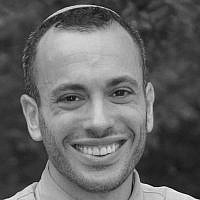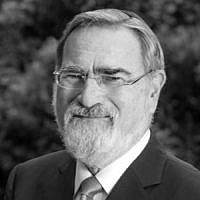Of Influence and Impact: Esther and Our Children
“If all your friends jumped off a bridge, would you?”
So goes the dismissive parental response to a child’s feeble attempt to contextualize his own bad behavior. The parent demands accountability and refuses to accept such dereliction.
What if this passive-aggressive platitude is not only obnoxious, but thoroughly misguided?
In other words, the child has a point. If all of my friends, the people whose intuition I most trust, chose to jump off a bridge, I would think long and hard about their motives. I believe that I surround myself with thoughtful and virtuous individuals, and I would more quickly give them the benefit of the doubt than dismiss them reflexively.
Perhaps the bridge is low enough that it makes a great diving board. Perhaps there is some other impending disaster, and jumping is a calculated risk.
I am unsure whether or not I would join them, but I’m relatively certain (or, at least, exceedingly hopeful) that I would not simply dismiss them. Our confidantes are, in many ways, the most important people in our own character development. Who we surround ourselves with has an outsized impact on who we become. If it ultimately is revealed that my peers truly had no purpose in jumping off the bridge other than accelerating their own demise, I would nonetheless stand by my process. I should trust them.
The problem is not in my misplaced faith, but in my judgement in identifying confidantes in the first place. The issue is not that I followed my friends; the issue is the friends that I followed. I believe that this distinction is pivotal.
As a parent and as an educator I encourage my children to explore their friends’ actions with open curiosity. Peer pressure is not a universal ill; it could, just as easily, be the impetus for positive behavior. The problem is not in following friends; the challenge is identifying good friends in the first place.
This idea is a subtle, but undeniable, theme throughout the Book of Esther. Scene after scene and character after character are transformed by the advice of confidantes. Some good, some awful. Hardly any action is taken throughout the entire book without the consultation of peers. The most pivotal turning points are all products of friendly advice. G-d may be absent from the scroll, but characters are hardly acting from their own intuition. A scan- through the book is overwhelming.
– After Vashti fails to appear at his party the King seeks counsel from his advisors (1:13). Memuchan (19) advices him to banish Vashti, and he obliges.
– Mordechai advises Esther against revealing her ethnicity or her people (2:10), leaving the reader to wonder how it would have impacted Haman’s brutal request just verses later.
– In 3:4 Haman’s servants notice and continuously point out to him that Mordechai is refusing to bow. Only after they point it out does he become enraged.
– Just 5 verses later in 3:9 Haman assumes the role of advice-giver, this time pressuring King Achashverosh to sign a bill to eliminate the Jews.
– Hatach assumes the role of intermediary in Chapter 4, relaying Mordechai’s advise to Esther, and Esther’s request for a fast on her behalf.
– In her tremendous excitement Zeresh tells Haman to erect the gallows (5:14) to hang Mordechai. Those gallows would be his ultimate grave.
– Those gallows only became his grave because Charbonah (7:9) suggests to Achashverosh that they be used to hang Haman himself. Who know what the punishment could otherwise have been.
– In 6:7 we read the most immediately counterproductive moment of advice offering, as Haman inadvertently advises the king to dress Mordechai in the royal garb and allow him to sit on the royal horse.
The Book of Esther is a story of influence and impact. It is about giving and taking advice. A contrasting of Esther and Achashverosh offers a compelling distinction. Though both accepted counsel, the diligence of their process was incomparable.
Achashverosh, pictured by many as a fool, is described far more nefariously by the rabbis. Rashi says that he was evil from beginning to end. How can Rashi possibly say that, when the story ends with Achashverosh completely empowering the Jewish people? He can say this because even Achashverosh’s positive contributions were circumstantial at best. He gave as much though to banishing Vashti, murdering Jews, or hanging Haman, namely: none. Someone—whether Memuchan, Haman, or Chabonah—suggested it and he accepted it. Achashverosh gave little to no thought to who he surrounded himself with. He accepted their advice, seemingly without hesitation.
Esther, on the other hand, accepted only the counsel of her most trusted confidante. Not only that, she pushed back and challenged. While Achashverosh often accepted the advice in the very same verse (see, for example 7:9), it takes an entire chapter for Mordechai to convince Esther.
Had Achashverosh’s friends jumped off a bridge he almost certainly would have followed. He would have given little thought, however, to who those friends are, and what might be the consequence of his deeds. Had Esther been placed in a similar circumstance, perhaps ultimately she would have followed, and perhaps she would not have. She would trust the friends for good reason, and would question them, with good intentions. The process would appear radically different.
As I watch young children developing meaningful friendships, I find this message entirely resonant. I hope that they do, in fact, develop friends and advisors in whom they place tremendous trust. I hope they consider those friends’ rationale behind ostensibly absurd actions. And I hope that they never neglect their own responsibility in the name of that trust. We must teach our children to be judicious in deciding where to place their trust, and to question deeply even those they trust most thoroughly. We must give them the skills and dispositions to recall, always, that who we surround ourselves with becomes who we are. It is up to us: who will we become?



